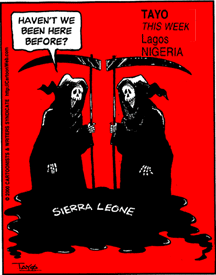
Doug Bandow
http://www.jewishworldreview.com -- SIERRA LEONE has struck yet another blow against U.N. peacekeeping. America's U.N. ambassador, Richard Holbrooke, naturally argues that Sierra Leone "is not a metaphor for U.N. peacekeeping." But how could it be otherwise?
Even U.N. Secretary-General Kofi Annan admits that the United Nations can't do the job. His solution is to strengthen U.N. operations.
Sierra Leone is one of a long list of African slaughterhouses: Angola, Burundi, Chad, Congo, Ethiopia, Liberia, Mozambique, Rwanda, Somalia, Sudan. In none of them has the United Nations stopped the killing, let alone resolved the underlying conflicts.
Diplomatic pressure, expressions of international outrage, and U.N. missions have all failed. People die, refugees flee, children starve, societies disintegrate.
The only strategy that has worked is military force. In 1995, Sierra Leone's government was tottering before an offensive of the Revolutionary United Front. The regime hired the firm Executive Outcomes, made up of South African mercenaries, which routed the RUF.
But one requirement of the political "settlement" pushed by the United States was to send Executive Outcomes home. U.N. peacekeepers proved to be dismal replacements.
In early May, the RUF seized hundreds of Zambians, stealing their equipment, weapons and even their uniforms. The RUF, with its trademark of chopping off the hands and arms of helpless civilians, began marching on Freetown, the nation's capital, sparking panic.
Then, 800 British soldiers arrived to evacuate Westerners. The RUF faded back into the bush.
Indeed, when London announced that its troops' work was done, President Ahmad Tejan Kabbah begged Britain to reconsider. Unable to defend itself and unwilling to trust the United Nations, his regime tried to throw Sierra Leone back into the arms of its old colonial master.
So, Annan really isn't talking about the United Nations when he says that "We have to rethink how we equip troops and prepare them for these operations." He is talking about calling upon real soldiers from real countries using real weapons to fight and kill.
As retired Australian Gen. John Sanderson, who headed U.N. operations in Cambodia, puts it: "You either go to war or go home." It is a more coherent view, but a much more dubious strategy.
It would entangle nations in potentially endless conflicts with no relevance to their security. It would risk soldiers' lives for interests unrelated to those of their own political communities. And it would turn Western states into new colonial powers.
 |
Kabbah might want British troops to stay, but Prime Minister Tony Blair would never yield control over the use of those troops. Nor could he ignore the character of the regime, which he would be protecting. London would end up ruling the nation.
In practice, writes columnist Charles Krauthammer, "the only serious way to intervene is to occupy. Take over the country, reorder the society, establish new institutions and create the basis for leaving one day."
In short, if it's serious enough to have your soldiers kill and be killed, it's serious enough to stick around and finish the job.
In fact, American University Professor George Ayittey proposes just such a U.N. trusteeship for Sierra Leone, "a failed state, its government long ago hijacked by gangsters." He would spend five to 10 years fixing the country.
But such an approach would require sustained military support by the handful of Western states with sizable and effective militaries. Count out the nations reluctant to act for historical reasons (particularly Germany and Japan), and you are down to the United States, Britain, France, Italy and, maybe, India, Turkey and Russia.
Moreover, Sierra Leone would be only the beginning. Two-score countries across Africa and Asia warrant the same treatment.
Nor would such trusteeships guarantee success. The former colonies, such as Sierra Leone, went through decades of a process that, theoretically at least, should have prepared them for independence. Most of them were freed with a full panoply of economic, legal and political institutions. No matter.
Five or 10 years of renewed foreign rule would also be insufficient to eliminate the underlying hatreds, passions, and ambitions that have sparked scores of endless and endlessly bloody civil and guerrilla wars. Indeed, memories of prior discrimination and butchery often outlast even lengthy periods of seeming peace and stability - witness the Balkans.
Yes, we should rethink peacekeeping, as Annan desires. But, the answer is not, as he contends, to create a U.N. rapid-deployment force and prepare it to fight. The solution is to confine U.N. peacekeeping to where there really is peace to keep. And to leave peacemaking to countries with enough at stake to do the job
JWR contributor Doug Bandow is a senior fellow at the Cato Institute.
Comment by clicking here.
06/07/00: The Clinton regulatory miasma
06/01/00: Administration stupidity, congressional cowardice
05/25/00: The silence of the international community
05/18/00: Protecting the next generation
05/11/00: Freer trade with China will advance human rights
05/04/00: How not to save the Constitution
04/28/00: American tripwire in Korea long ago disappeared: Why are we still involved?
04/18/00: Clinton administration believes the IRS is too gentle, wants more auditors
